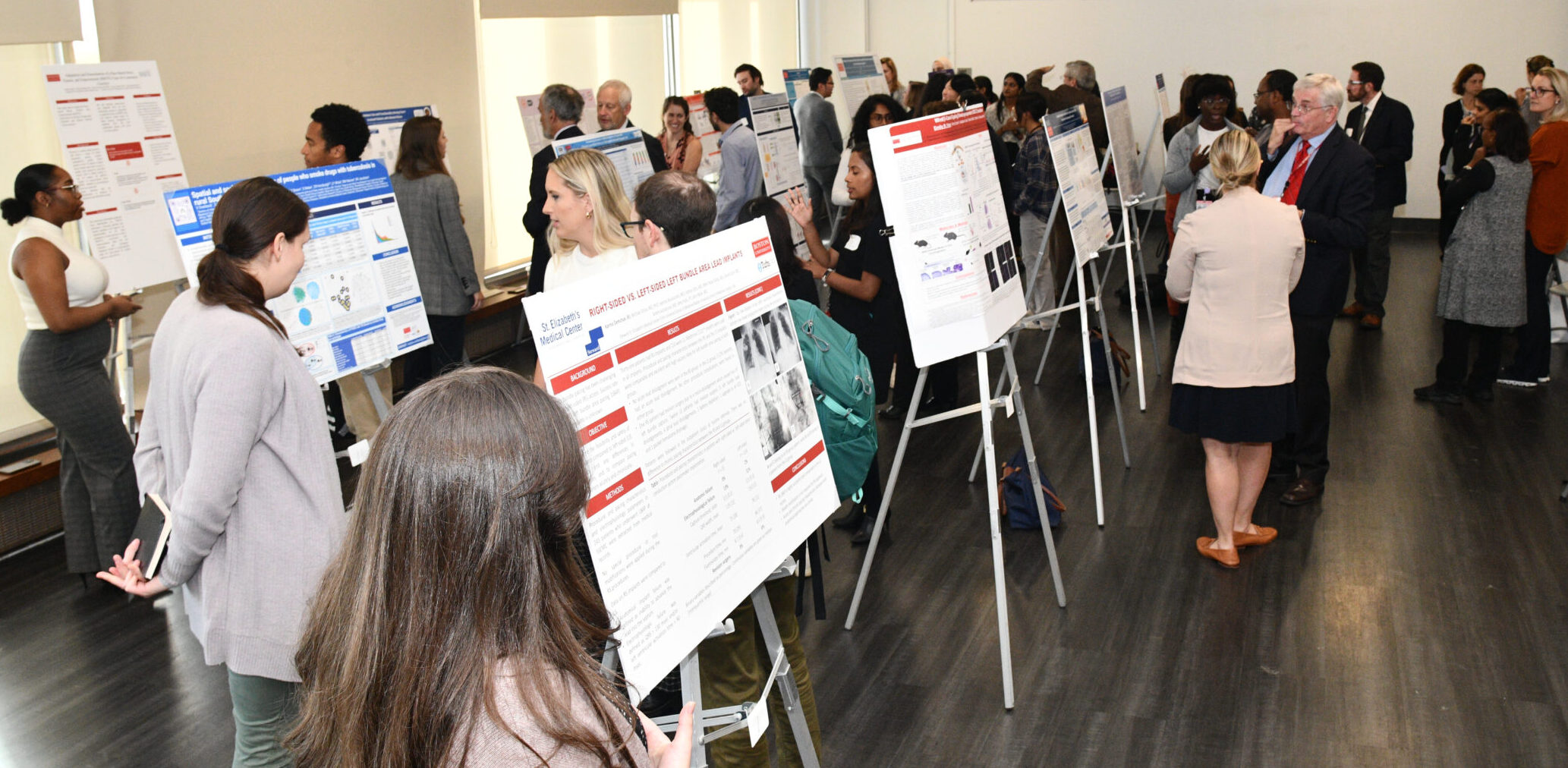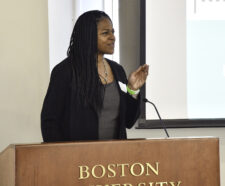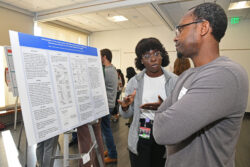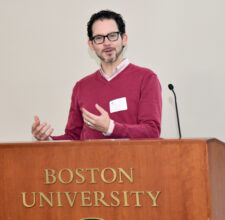11th Annual BU-CTSI Symposium Focused on Advancing Health Equity
 CTSI symposium poster session.
CTSI symposium poster session.
This year’s Clinical & Translational Science Institute’s (CTSI) annual symposium, “Advancing Health Equity through Translational Science,” was held in the Hiebert Lounge both in-person and virtually on Thursday, Oct. 24. The 11th annual symposium featured a keynote speaker, nine presentations on CTSI research, a panel discussion and a poster session. It was dedicated to the memory of David Seldin, MD, PhD, the Wesley and Charlotte Skinner Professor for Research in Amyloidosis and a professor of medicine and microbiology, who passed away in 2015 at the age of 58.
“Any time his name is mentioned, the people who did know him are effusive about his wisdom, compassion and his commitment to this day,” said Megan Bair-Merritt, MD, MSCE, chief scientific officer of Boston Medical Center, professor of pediatrics and BU-CTSI principal investigator, in welcoming attendees to the symposium.
The BU-CTSI was founded in 2008 to discover new ways to improve the health of all individuals by turning observations into interventions to address inequities and better health outcomes through partnership with affected individuals and communities. Translational science is focused on bringing scientific discoveries from bench to bedside and to the community.
“We strive to use data to uncover inequities and move to collective action to improve the health of all populations,” Bair-Merritt said.
 Keynote speaker Bisola Ojikutu, MD, MPH, executive director of the Boston Public Health Commission
Keynote speaker Bisola Ojikutu, MD, MPH, executive director of the Boston Public Health Commission
“The data should disturb you,” said keynote speaker Bisola Ojikutu, MD, MPH, the executive director of the Boston Public Health Commission.
Ojikutu was referring to data showing that measures of health including life expectancy and infant mortality hadn’t improved much for Black and Latinx populations over the past 20 years.
“We’ve spent a lot of money, why haven’t we fixed this?” she asked.
Ojikutu said Boston needed structural interventions that altered the political, social and economic environments that create the social determinants of health (SDOH). She talked about a bill in the state legislature, An Act to Advance Health Equity, by Representatives Bud Williams of Springfield and Judith Garcia of Chelsea, with measures to prioritize health equity and to establish a secretary of equity.
“It’s difficult to move the needle around life expectancy,” said Ojikutu. “What it takes is a community. It takes us to make it higher on the priority list.”
 Health equity, she said, was not just about changing policies but required mobilizing and empowering the affected communities. Surveys of the homeless population who live in the tents along Massachusetts Avenue and Melnea Cass Boulevard, also known as ‘Mass and Cass,’ showed that housing was their top concern. The city embarked on pilot programs at six Boston sites where they built housing with a low-to-no condition threshold for occupancy resulted in less drug use for those tenants and 66% of the tenants said they felt hopeful about the future.
Health equity, she said, was not just about changing policies but required mobilizing and empowering the affected communities. Surveys of the homeless population who live in the tents along Massachusetts Avenue and Melnea Cass Boulevard, also known as ‘Mass and Cass,’ showed that housing was their top concern. The city embarked on pilot programs at six Boston sites where they built housing with a low-to-no condition threshold for occupancy resulted in less drug use for those tenants and 66% of the tenants said they felt hopeful about the future.
A broad range of topics was covered by the CTSI presenters outlining their health equity projects. Three presenters, Jeffrey Samet, MD, MA, MPH, professor of medicine, Tracy Battaglia, MD, MPH, professor of medicine, and Jai Marathe, MBBS, assistant professor of medicine, joined a panel discussion where they answered questions on the role of social media in changing inequities, system changes leading to better patient care, community engagement, how to sustain and evaluate the impact of a study on a community and how to build trust and accountability.
 Pablo Buitron de la Vega, MD, MSc, assistant professor of medicine presenting research at CTSI symposium.
Pablo Buitron de la Vega, MD, MSc, assistant professor of medicine presenting research at CTSI symposium.
Projects and their presenters at the symposium included:
- The HEALing Communities Study: The Reality of Implementing a Community-engaged Protocol in Local Settings. Jeffrey Samet, MD, MA, MPH professor of general internal medicine and professor of public health.
- Translating Research into Practice (TRIP) for Health Equity: Patient Navigation in Breast Cancer Care. Tracy Battaglia, MD, MPH professor of medicine and co-director of BU CTSI-Community Engagement.
- Boston COVID Recovery Cohort. Jai Marathe, MBBS assistant professor of medicine.
- Implementing an EHR-based Screening and Referral System with the Community to Address Social Determinants of Health in Primary Care. Pablo Buitron de la Vega, MD, MSc, assistant professor of medicine.
- Neonatal Opioid Withdrawal Syndrome – Advancing Science Utilizing Translational Approaches. Elisha Wachman, MD, associate professor of pediatrics, and Kelly Wingfield, PhD student in pharmacology.
- Translational Informatics to Advance Health Equity. William ‘Bill’ G. Adams, professor of pediatrics and director of BU-CTSI Informatics.
- Implementing Telemedicine to Improve Appropriate Antibiotic Prescribing for Acute Respiratory Tract Infections: Using Patient- and Provider-Engaged Methods. Mari-Lynn Drainoni, PhD, research professor and co-director of Evans Center for Implementation and Improvement Sciences; Tamar Barlam, MD, MSc, professor of medicine and chief of Infectious Diseases and director of Antimicrobial Stewardship at BMC.
- Social Drivers of Health and Cardiovascular Disease. Hugo Aparicio, MD, MPH assistant professor of neurology.
View the winners of the poster session.
View all posts